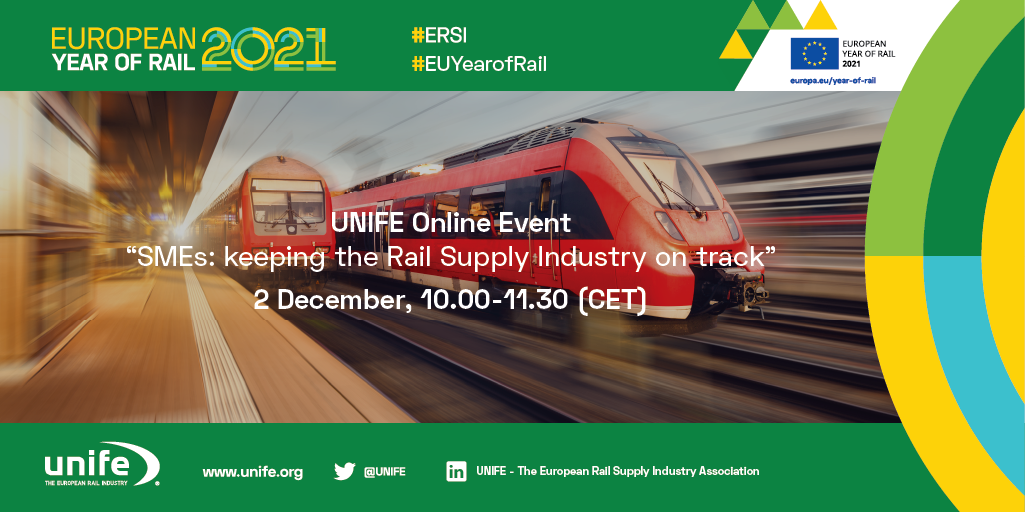SMEs: Keeping the Rail Supply Industry on Track
For almost two years now, the COVID-19 pandemic has introducing unprecedented barriers to both normal life and the economic activities that accompany it. Despite these challenges, European rail and the suppliers that allow for its reliable service have continued to provide sustainable and safe products while pursuing innovations that will make them even more so. Small and Medium Enterprises (SMEs) are important stakeholders that allow for the uninterrupted provision of the components and systems that permit the flow of essential personnel, goods and equipment to where they are needed most.
To celebrate and bring attention to the invaluable contributions these companies make to our ever-evolving transport network, UNIFE held a digital event on 2 December, as part of its year-long 2021 European Year of Rail discussion series, to showcase some of our SMEs members’ best innovations and explain how EU funding for infrastructure and digitalisation results in increased competitiveness of rail manufacturers’ products. High-level representatives from the European Commission’s DG GROW, Tesifer, Elcowire, and Oltis Group shared how these elements prove to be crucial for a strong rail supply industry with SMEs as its backbone.
During the panel discussion, moderated by Roger Dirksmeier, Member of the UNIFE Presiding Board, representing the UNIFE SME Committee and Managing Director of FOGTEC, the speakers agreed that SMEs, which make up approximately one-third of UNIFE’s 100+ membership, would benefit from the implementation of the Expert Group of the Rail Supply Industry’s 88 recommendations concerning: standardisation, access to finance, access to international markets and support to innovation. Additionally, as these companies are often the source of significant innovation, they were supportive of the Single Basic Act’s recent passage which officialised the launch of Shift2Rail’s successor programme Europe’s Rail Joint Undertaking. Panellists described it as a key enabler of ongoing rail research initiatives that will focus on digital innovation and automation to achieve the radical transformation of the rail system needed to deliver on the European Green Deal objectives. Turning to concrete efforts to decarbonise transport, they centred the conversation on the topic of sustainable solutions such as those provided through electrification of railways. The speakers also explained to attendees how the Connecting Europe Facility (CEF) has been central to their successful collaborations with rail Infrastructure Managers and encouraged eligible companies to partake in the first round of calls for proposals, totalling €7 billion, under the new CEF Programme.
Roger Dirksmeier, Member of the UNIFE Presiding Board, representing the UNIFE SME Committee and Managing Director of FOGTEC, in his opening remarks pointed to the fact that “SMEs are in fact keeping the rail supply industry on track, despite numerous challenges that are taking place in these times. As the backbone of the rail supply industry, our SMEs are committed to delivering the best quality, innovative and sustainable products for a strong and competitive European Rail Supply Industry.”
Mehdi Hocine, Deputy-Head of Unit of Mobility Ecosystem at the European Commission’s DG GROW, said: “SMEs are at the core of the rail supply industry. They provide innovation, expertise, agility and highly qualified workforce. The upcoming Mobility transition pathways will help to create with all stakeholders a green, digital and resilient ecosystem. Special focus will be given to the SME dimension".
Simone Durazzani, CEO and Technical Director at Tesifer, speaking to SMEs’ role in Europe’s next generation railway network added: “The universally applicable SmartTrack is an innovative new software for ERTMS. It helps Railway Infrastructure Managers to optimise all future maintenance activities on the line and on the ERTMS track-side systems, thus, ensuring huge savings. SmartTrack is conceived from the survey to ERTMS design for a complete Railway maintenance”.
Hans-Peter Wipfler, Sales Manager Railway at Elcowire, illustrated SMEs' contributions to sustainable transportation by explaining: “At Elcowire, we continuously innovate to enable greener ways to meet tomorrow’s electricity needs. For example, with the promotion of copper alloy products in electrified railways and tram systems we are helping our customers to minimize their carbon footprint and advance on the decarbonization of transport”.
Tomáš Kroča, Sales Director of Oltis Group, highlighted the importance of EU funding schemes to optimal SME contributions to EU mobility goals: “The Connecting Europe Facility (CEF) is a fundamental EU funding programme to further develop the European rail system. Oltis has successfully demonstrated its good practices on the implementation of TSI TAF requirements in cooperation with the railway undertakings in Czechia and Slovakia through an EU CEF funded project”.
In his closing remarks, UNIFE Director General Philippe Citroën clearly described the central role these companies play in the EU rail ecosystem: “SMEs are a crucial element in order to have a competitive European rail supply industry which is a crucial component of European industrial growth, jobs and innovation”.
